外研社九年级上册Module 5 语法
外研版九年级(上)英语第10讲:Module 5 语法(教师篇)
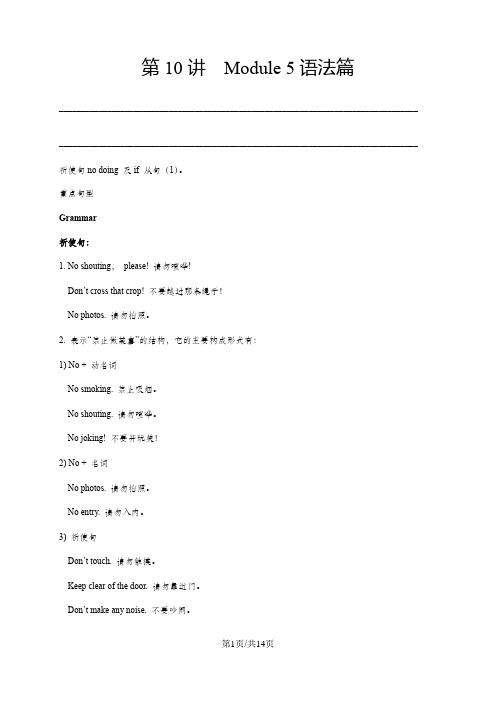
第10讲Module 5语法篇__________________________________________________________________________________ __________________________________________________________________________________祈使句no doing 及if 从句(1)。
重点句型Grammar祈使句:1. No shouting,please! 请勿喧哗!Don’t cross that crop! 不要越过那条绳子!No photos. 请勿拍照。
2. 表示“禁止做某事”的结构,它的主要构成形式有:1) No + 动名词No smoking. 禁止吸烟。
No shouting. 请勿喧哗。
No joking! 不要开玩笑!2) No + 名词No photos. 请勿拍照。
No entry. 请勿入内。
3) 祈使句Don’t touch. 请勿触摸。
Keep clear of the door. 请勿靠近门。
Don’t make any noise. 不要吵闹。
Keep off the grass. 请勿践踏草坪。
if引导的状语从句。
if引导的状语从句不是指已经发生的事件,而是指能够发生或可能发生的事件。
if从句+祈使句,相当于汉语的“如果……,就……”。
1. if从句的构成,例句:If you want to go,please tell me.如果你想去的话,请告诉我一声。
If you want to know more about it,call now.如果你想了解更多内容,现在就打电话吧。
If you want to know what to see,look at the guide.如果你想知道可参观的内容,就读一下指南吧。
if后面通常接一个完整的句子作从句。
外研社九年级上册英语 Module 5 词汇与语法基础(解析版) (2)

知识图谱Module 5 Museums知识精讲一、必背词汇upstairs [ˌʌpˈsteəz] adj.&adv. 位于楼上的;往楼上,在楼上exhibition [ˌeksɪˈbɪʃn] n. 展览,展览会rule [ruːl]n. 规则,法则tail [teɪl] n. 尾,尾巴rope [rəʊp] n.粗绳,绳索entry [ˈentri]n. 进入权,进入许可missing [ˈmɪsɪŋ]adj. 找不到的,失踪的downstairs [ˌdaʊnˈsteəz] adj.&adv. 位于楼下的;往楼下,在楼下punish [ˈpʌnɪʃ] v. 惩罚,惩处communications [kəˌmju:nɪˈkeɪʃn] n. [复数]通信physics [ˈfɪzɪks] n. 物理学chemistry ['kemɪstrɪ] n. 化学dig (dug, dug) [dɪg] v. 挖掘,掘(洞)coal [kəʊl] n. 煤energy [ˈenədʒi] n. 能量,能源X-ray [ˈeksrei]n. X射线,X光experiment [ɪkˈsperɪmənt] n. 实验sand [sænd] n. 沙,沙子control [kənˈtrəʊl] v. 操作,操纵truck [trʌk] n. 卡车,货车wheel [wi:l] n. 轮子,车轮whole [həʊl] adj. 全部的;整个的二、重点词汇1. exhibition [ˌeksɪˈbɪʃn] n.an event at which objects such as paintings are shown to the public, a situation in which someone shows a particular skill or quality to the public, or the act of showing these things展览(会);表现,显示例句:The photographs will be on exhibition until the end of the month.这些照片将一直展出到月底。
外研英语九上module5知识点

MODULE 5 Museums1.祈使句:用于请求劝告或命令的句子。
一般由Be Do Don’t Let 等构成,称为V 型。
还有:①N 型: No smoking 禁止吸烟②Adj 型:Careful! 小心!③Adv 型:Quickly! 快!○3过去分词的否定形式也表示祈使语气;Swimming Not Allowed. 禁止游泳2. look forward to doing sth. 盼望做某事,期盼做某事3.on one’s own 独自(可单独做表语或状语)=by oneself 亲自=alone4.pay attention to 注意(后跟名词、代词、动名词)don’t pay any attention 不在意6.alone ①形容词单独的,独一无二的只可作表语②副词单独地,独自(客观状态,无感情色彩)lonely 只作形容词孤独的,寂寞的,荒凉的既可作表语也可做定语(表示人的情感)She lives alone but she doesn’t feel lonely.He is a lonely man but he doesn’t feel alone.7.as well 也,又用于句末但不用逗号隔开,而too须用逗号隔开also 也,还用于肯定句中,位于be 动词之后,实义动词前too 也用于肯定句句末,用逗号与句子隔开either 也用于否定句句末,用逗号与句子隔开8.1)upstairs downstairs here there 等都是副词,前面有动词时,中间不可加介词2) today、here、there、downstairs、upstairs、above、below做宾语修饰名词,放在名词之后e.g. the weather today今天的天气people here这里的人们the man downstairs楼下的那个男的the passage below 下面的这段话9.against the rules 违反规定obey the rules 遵守规则10.have to = have got to 不得不,必须(客观原因It’s dark, I have to go home.Must 必须(主观意愿,指说话人强加的义务)You must go home now !11.hang on a minute 等一下12.go up 上去e back 回来14.look at the sign. 看这个标志15.by Friday 星期五之前by 直到…为止16.1)go off 走了=leave2)go off还可以表示“熄灭,停电;质量变坏,恶化”等含义17.amazing sculpture 奇妙的雕像surprising news 惊人的消息falling sand 流沙18.just 刚才,刚刚;正好;只想only just 刚刚好、恰好19.hurry up 赶快(不用于否定句,常用语命令句)Hurry up, or you’ll be late.in a hurry 匆忙的(地)慌忙的(地)You are always in a hurry. be in no hurry to do 不急于做…;无意…;不愿意…I’m in no hurry to buy a car. 我并不急于买车in one’s hurry to do sth. 匆忙之中干某事,情急之下干某事20. You are taking so long. 你耽搁时间太长了21.It’s kind of familiar! 有点熟悉呀!a kind of 一种all kinds of 各种各样的kind of 多少有点,有几分of a kind ①同种类的They are all of a kind. 他们全是同一类的②徒有其名的,劣质的,勉强算是…的She made us coffee of a kind, but it had no taste. 她给我们泡了劣质的咖啡,什么味道也没有22.look like 看起来像sound like 听起来像23.No wonder (that) + 从句= It is no wonder (that) + 从句,可翻译为“难怪,一点都不奇怪”24.very funny 太有意思了25.No photography 禁止拍照26.be not allowed to do 不允许做be allowed to do 被允许做。
外研版九年级(上)英语第10讲:Module 5语法(学生篇)
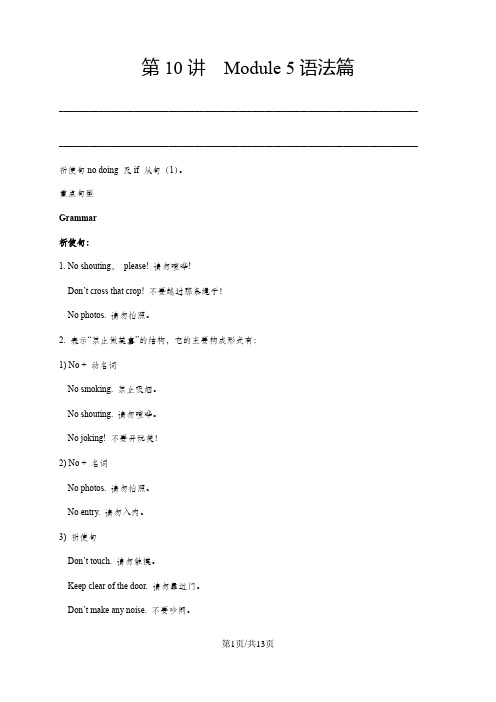
第10讲Module 5语法篇__________________________________________________________________________________ __________________________________________________________________________________祈使句no doing 及if 从句(1)。
重点句型Grammar祈使句:1. No shouting,please! 请勿喧哗!Don’t cross that crop! 不要越过那条绳子!No photos. 请勿拍照。
2. 表示“禁止做某事”的结构,它的主要构成形式有:1) No + 动名词No smoking. 禁止吸烟。
No shouting. 请勿喧哗。
No joking! 不要开玩笑!2) No + 名词No photos. 请勿拍照。
No entry. 请勿入内。
3) 祈使句Don’t touch. 请勿触摸。
Keep clear of the door. 请勿靠近门。
Don’t make any noise. 不要吵闹。
Keep off the grass. 请勿践踏草坪。
if引导的状语从句。
if引导的状语从句不是指已经发生的事件,而是指能够发生或可能发生的事件。
if从句+祈使句,相当于汉语的“如果……,就……”。
1. if从句的构成,例句:If you want to go,please tell me.如果你想去的话,请告诉我一声。
If you want to know more about it,call now.如果你想了解更多内容,现在就打电话吧。
If you want to know what to see,look at the guide.如果你想知道可参观的内容,就读一下指南吧。
if后面通常接一个完整的句子作从句。
Module5知识点外研版英语九年级上册
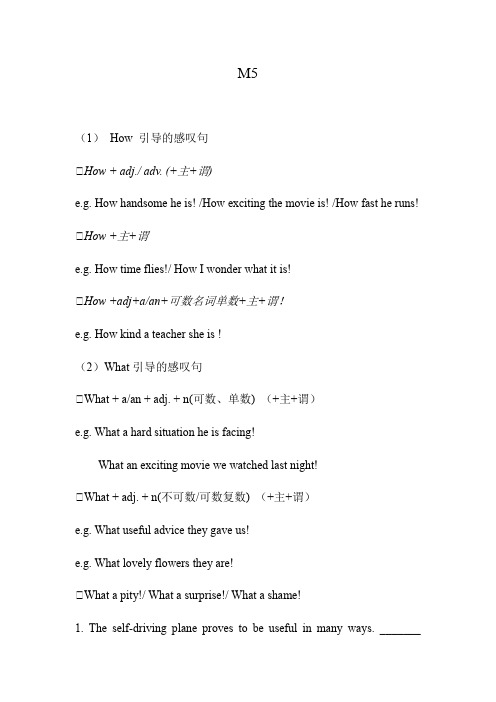
M5(1)How 引导的感叹句①How + adj./ adv. (+主+谓)e.g. How handsome he is! /How exciting the movie is! /How fast he runs!①How +主+谓e.g. How time flies!/ How I wonder what it is!①How +adj+a/an+可数名词单数+主+谓!e.g. How kind a teacher she is !(2)What引导的感叹句①What + a/an + adj. + n(可数、单数) (+主+谓)e.g. What a hard situation he is facing!What an exciting movie we watched last night!①What + adj. + n(不可数/可数复数) (+主+谓)e.g. What useful advice they gave us!e.g. What lovely flowers they are!①What a pity!/ What a surprise!/ What a shame!1. The self-driving plane proves to be useful in many ways. _______smart invention it is! (2018·上海中考)A. WhatB. What aC. What anD. How2. The self-driving plane proves to be useful in many ways. _______ smart the invention is! (改编)A. WhatB. What aC. What anD. How2.upstairs / downstairsadj:位于楼上/楼下的There are all kinds of books in the downstairs bookstore.adv:往楼上/下,在楼上/下go downstairs2.exhibition n 展览,展览会exhibit n 展览品e.g. it displays thousands of exhibits about the nature and history of Anhui.show; display规则traffic rules rulerbe against the rules / break the rules 违反规则follow/ obey/keep/observe the rules 遵守规定be against.... 反对.... be for.... 赞同....e.g. All of us are against the idea except him.e.g. To his joy, everyone is for his suggestion.4.trouble n. 麻烦,困境v.给..造成麻烦What's the trouble with you?/What's wrong with you?/What's the matter with you?/What's up?短语:be in trouble/get into trouble/ have trouble (difficulty/problems) in doing sthe.g. If you are in trouble abroad, just ask the police for help.e.g. I have trouble/difficulties problems (in) learning English.拓展:troublemaker / troublesome 麻烦的,讨厌的e.g. This boy is really troublesome.5.No entry. 禁止入内!entry 进入权entrance 入口the entrance to .... 的入口enter vt 进入,考取,参加enter the competition 参加比赛enter a university 考入大学6.why not (1)表示建议,= why don’t you do... 为什么不....样呢?(2)表示同意或赞同,“好的”Let’s eat out tonight. Why not?好的(3)表示坚持自己的观点,态度或做法,“为什么不可以呢”-Are you really going to punish him? -Yes, why not?7.no good 不合适的常用句型:(1) be no good to sb. 对某人没有用处e.g. It's no good crying now.It's no use doing sth. / It’s useless to do sth 做某事没有用8.no wonder 难怪,不足为奇e.g. The museum is really amazing, no wonder so many people visit here all year round.句型:(It is) no wonder (that)+从句e.g. Betty's dad is a piano teacher. It is no wonder that he plays the piano so well.10.punish 惩罚punish sb for doing sth 因某事惩罚某人e.g. His mother punished him for his rudeness.e.g. If you don't follow the classroom rules, you will be punished.e.g. To make you better, punishment is necessary.munications n(pl)通信communication un 交流communicate v 交流communicate with sb 与某人交流11.physics 物理physicist 物理学家physical 身体的;物理的Physical Education 体育physical and mental health 身心健康e.g. You'd better take a physical check-up regularly.chemistry 化学chemist 化学家chemical 化学的13.dig (dug/dug/digging) dig a hole/ coal14.fill...with ... be filled with/ be full of /be crowded with15.control v 操作,操纵n 控制under control/ out of controle.g. The situation is still under control, but if you don't find out a solution, it will be out of control soon.pare...with/to.... compared with 与...相比e.g. Compared with the sun, our earth is just like a ping-pong17.energy 能源,能量create energy /green energy活力,精力 e.g. Teenagers should be full of energy. energetic 充满活力的,精力充沛的e.g. Sports keeps me energetic.18.sand n 沙子sandy 沙地的,含沙的sandbeachsandglass sandstorm desert19.wheel wheelchair20.in the whole world 全世界whole:多用来修饰可数名词单数,一般不修饰不可数名词位于限定词(冠词/形容词性物主代词/指示代词/所有格)之后the whole day/my whole lifeAll: all +限定词+n (all+复数名词,可不加the)/ all of +人称代词/+限定词+人称代词复数)all students /all the students/all of the students21.as well: “也”,位于句尾,相当于tooe.g. I am good at chemistry, and I do well in physics as well.as well as 和...一样好,和并列两个主语时,谓语动词遵循就远原则(with/along with/together with /except/like/but)e.g. Jim as well as his parents _______ (like) watching football matches.就近原则:there be /not only...but also.../neither...nor / either ...or..) 22.free adj 免费的,自由的(freedom)空闲的(spare)in one’s free/sparetimee.g. The ticket is free for children under 11.Grammar——if条件状语从句1. 条件状语从句的引导词:if(如果);as long as...(只要);unless(除非)注意if的双重性(引导宾从的连词/引导条件状从的连词)。
外研版九年级英语上册Module-5-Unit-3知识点

Module 5 MuseumsUnit 3 模块语法-表“禁止做某事”的结构和if 条件状语从句(1)本模块重要结构:“禁止做某事”,多是祈使句,常用于公共场合警示语。
① Don’t +动原(+其他)Don’t cross that rope! 不要越过那条绳子! ② No+v-ing. No fishing. 禁止垂钓。
No swimming.禁止游泳。
No smoking.禁止吸烟。
③ No+名词. No entry. 禁止入内。
No photos. 禁止拍照。
No pets.禁止宠物。
④ 主+ can’t/mustn’t +动原(+其他)You can’t park your car here. 你不能在这里停车。
You mustn’t swim in the lake. 不能在湖里游泳。
(2021·湖北省黄冈市·月考试卷)—What rules do you have in your school? —_________ eat in the classroom.A. Can ’tB. Don ’tC. Isn ’tD. Doesn ’t【答案】B【解析】句意:——你们学校有什么规定?——不要在教室里吃东西。
此处为否定祈使句,Don ’t+动词原形。
故选B 。
if 当“如果”讲时,引导的从句是一种条件状语从句。
if 条件状语从句分为真实条件从句和虚拟条件从句。
真实条件从句适用于主将从现,是假设有可能发生的。
而虚拟条件从句是假设不太可能发生的。
虚拟语气是高中英语的重难点。
初中阶段我们只学习if 引导的真实条件状语从句。
知识精讲本模块我们学习的if条件状语从句结构是:“if条件从句+祈使句”,意为“如果……,就……”。
作为主句的祈使句,可以是肯定式,也可以是否定式。
此结构中的if条件从句通常用一般现在时。
✧If you ever go to London, make sure you visit the Science Museum.如果你去伦敦,一定要确保去参观科学博物馆。
外研社九年级上册英语 Module 5 词汇和语法基础(解析版) (2)

知识图谱Module 5 Museums知识精讲一、必背词汇upstairs [ˌʌpˈsteəz]adj.&adv. 位于楼上的;往楼上,在楼上exhibition [ˌeksɪˈbɪʃn]n. 展览,展览会rule [ruːl]n. 规则,法则tail [teɪl]n. 尾,尾巴rope [rəʊp]n.粗绳,绳索entry [ˈentri]n. 进入权,进入许可missing [ˈmɪsɪŋ]adj. 找不到的,失踪的downstairs [ˌdaʊnˈsteəz]adj.&adv. 位于楼下的;往楼下,在楼下punish [ˈpʌnɪʃ]v. 惩罚,惩处communications [kəˌmju:nɪˈkeɪʃn]n. [复数]通信physics [ˈfɪzɪks]n. 物理学chemistry ['kemɪstrɪ]n. 化学dig (dug, dug) [dɪg]v. 挖掘,掘(洞)coal [kəʊl]n. 煤energy [ˈenədʒi]n. 能量,能源X-ray [ˈeksrei]n. X射线,X光experiment [ɪkˈsperɪmənt]n. 实验sand [sænd]n. 沙,沙子control [kənˈtrəʊl]v. 操作,操纵truck [trʌk]n. 卡车,货车wheel [wi:l]n. 轮子,车轮whole [həʊl]adj. 全部的;整个的二、重点词汇1. exhibition [ˌeksɪˈbɪʃn]n.an event at which objects such as paintings are shown to the public, a situation in which someone shows a particular skill or quality to the public, or the act of showing these things展览(会);表现,显示例句:The photographs will be on exhibition until the end of the month.这些照片将一直展出到月底。
九年级英语上册 Module 5 Museums知识点 (新版)外研版
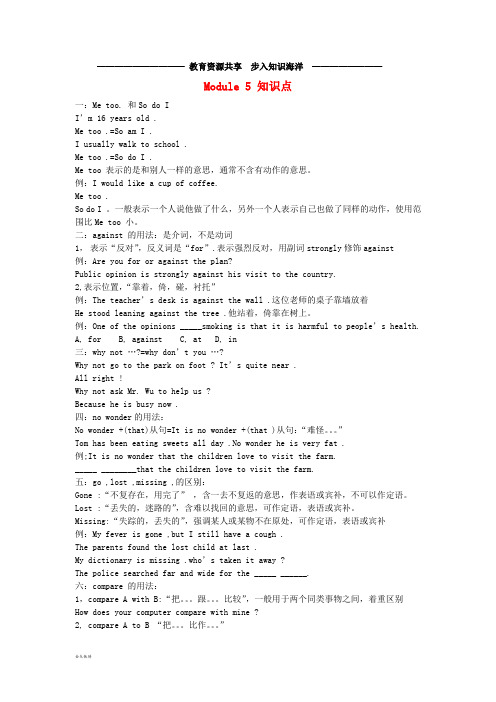
——————————教育资源共享步入知识海洋————————Module 5 知识点一:Me too. 和So do II’m 16 years old .Me too .=So am I .I usually walk to school .Me too .=So do I .Me too 表示的是和别人一样的意思,通常不含有动作的意思。
例:I would like a cup of coffee.Me too .So do I 。
一般表示一个人说他做了什么,另外一个人表示自己也做了同样的动作,使用范围比Me too 小。
二:against 的用法:是介词,不是动词1,表示“反对”,反义词是“for”.表示强烈反对,用副词strongly修饰against例:Are you for or against the plan?Public opinion is strongly against his visit to the country.2,表示位置,“靠着,倚,碰,衬托”例:The teacher’s desk is against the wall .这位老师的桌子靠墙放着He stood leaning against the tree .他站着,倚靠在树上。
例:One of the opinions _____smoking is that it is harmful to people’s health. A, for B, against C, at D, in三:why not …?=why don’t you …?Why not go to the park on foot ? It’s quite near .All right !Why not ask Mr. Wu to help us ?Because he is busy now .四:no wonder的用法:No wonder +(that)从句=It is no wonder +(that )从句:“难怪。
外研版九年级英语上册Module 5 知识汇总

Module5知识梳理【短语归纳】1. on the second floor 在二楼2. be against the rule 违反规定3. in trouble 处于困境4. No entry. 禁止入内。
5. That’s no good. 那不行。
6. Take a photo /photos / pictures 拍照7. No photos. 禁止拍照。
8. No wonder. 难怪。
9. be rude 粗鲁的10. go upstairs/downstairs上楼/下楼11. punish sb. for (doing) sth. 因(做)某事而惩罚某人He punished his son for copying homework.Tom was punished for fighting.12. There is no shouting and no running. 禁止喧哗和跑。
13. be different from 与……不同14. talk about sb. /sth. 谈论某人/某事15. the answer to the question 那个问题的答案the key to the door 门的钥匙16. dig coal挖煤17. physics experiments物理实验18. as well as 不仅……而且19. fill …with…把…装满…=be full of20. find out查明21. compare...with 把…和…相比较22. people of all ages 各个年龄段的人23. have a wonderful time玩得很开心24. be free 免费的25. allow sb. to do sth. 允许某人做某事allow doing sth. 允许做某事26. make anoise 发出噪音27. On the ground floor 在一楼28. take a boat trip乘船旅行29.have a high fever发高烧30. send an email发送电子邮件32.write down写下33. get into trouble陷入麻烦34.break the rule破坏规则35. keep quiet保持安静36. make sure确保;务必37. in the whole world在全世界38. Take the lift 乘电梯39. between...and...在.......和......之间40. drop in顺便拜访drop in on sb. 顺便拜访某人drip in at sp. 参观某地41. pay attention to 注意pay attention to(doing) sth. 注意(做)某事42. look forward to (doing) sth. 盼望(做)某事【用法集萃】1.What a/an+形容词+名词单数!多么......一个......!2. What’s the matter (with sb.)?(某人)怎么了?3. pay attention to (doing)sth.注意(做)某事4. look forward to doing sth.期待做某事5. without doing sth.没有做某事【话题写作】1、国有国法,校有校规,每所学校都有自己的校规校纪,在你的学校中一定有许多规章制度在规范学生的行为,使学生健康成长。
外研版九年级英语(WY)上册精品课件 Module 5 模块语法聚焦5
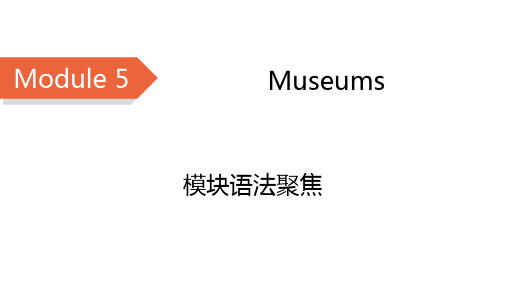
• ( )5.We didn’t go into the house because the sign said “_A_____”.
• A.No entry
B.No littering
• C.No fire
D.No shouting
( D )6.What does the sign
mean?
• A.No running.
• Ⅱ.单项选择。 • A ( )1.—Celia,join us in the Super Summer Camp if it _________ this weekend. • —I’d love to.But nobody knows if it _________. • A.is fine; rains • B.is fine;will rain • C.will be fine; will rain • D.will be fine; rain
)8._________ you drive,you mustn’t drink wine at
• A.If
B.Unless
• C.Though
D.Until
A
•(
)9._________ throwing those stones,please.
• A.Stop
B.Stops
• C.Stopping
• B ( )2.David,_________ make trouble at school.
• A.can’t
B.don’t
• C.doesn’t
D.mustn’t
• B ( )3.—The pollution in the sea is terrible!
• —I believe the sea will be cleaner _________ we take action
外研版九年级上module5知识点
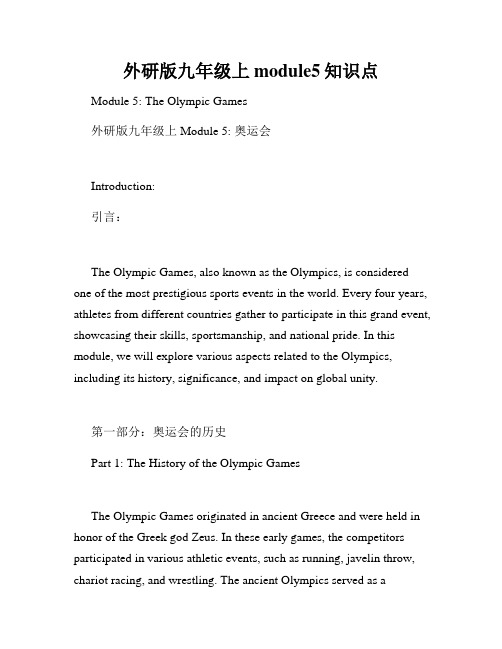
外研版九年级上module5知识点Module 5: The Olympic Games外研版九年级上Module 5: 奥运会Introduction:引言:The Olympic Games, also known as the Olympics, is considered one of the most prestigious sports events in the world. Every four years, athletes from different countries gather to participate in this grand event, showcasing their skills, sportsmanship, and national pride. In this module, we will explore various aspects related to the Olympics, including its history, significance, and impact on global unity.第一部分:奥运会的历史Part 1: The History of the Olympic GamesThe Olympic Games originated in ancient Greece and were held in honor of the Greek god Zeus. In these early games, the competitors participated in various athletic events, such as running, javelin throw, chariot racing, and wrestling. The ancient Olympics served as aplatform for athletes to showcase their physical prowess and honor their gods.However, the modern Olympics, as we know them today, were reintroduced in 1896 by Pierre de Coubertin. The first modern Olympic Games were held in Athens, Greece, with athletes from 14 countries competing in nine different sports. Since then, the Olympics have grown exponentially in scale and popularity.第二部分:奥运会的意义Part 2: The Significance of the Olympic GamesThe Olympic Games hold immense significance for both athletes and spectators alike. Firstly, the Olympics promote international goodwill and understanding by bringing together individuals from diverse backgrounds. The Games provide an opportunity for athletes to forge bonds and build friendships with individuals from different countries, encouraging cultural exchange and unity.Secondly, the Olympics inspire and motivate young athletes to pursue their dreams and push their limits. The sight of athletes from around the world achieving extraordinary feats serves as a powerfulreminder that determination and hard work can lead to success. The stories of Olympic athletes inspire generations and serve as a testament to the strength of the human spirit.第三部分:奥运会的影响Part 3: The Impact of the Olympic GamesThe Olympic Games have a profound impact on both the host country and the global community. Hosting the Olympics provides an opportunity for the host nation to showcase its culture, infrastructure, and hospitality to the world. It acts as a catalyst for economic growth, as investments are made in infrastructure development and tourism.Moreover, the Olympics often leave a lasting legacy on the host city. Many Olympic stadiums and facilities are repurposed for various events and activities, benefiting the local community for years to come. The Games also have a positive impact on tourism, attracting visitors from all around the world and boosting the local economy.On a global scale, the Olympics promote inclusivity and equality by providing equal opportunities for men and women to participate in sports. The presence of women competing in traditionally male-dominated sports has played a pivotal role in breaking down gender barriers and promoting gender equality.Conclusion:结论:In conclusion, the Olympic Games encompass not only a history of ancient competitions but also a modern-day celebration of sportsmanship, unity, and cultural exchange. The Games have come a long way since their inception, evolving into a global phenomenon that unites nations and inspires individuals. As we look forward to future Olympic Games, let us embrace the spirit of the Olympics and strivefor excellence, both on and off the playing field.总之,奥运会不仅代表了古代比赛的历史,也是当今体育精神、团结和文化交流的现代庆典。
九年级上册外研版英语module5知识点
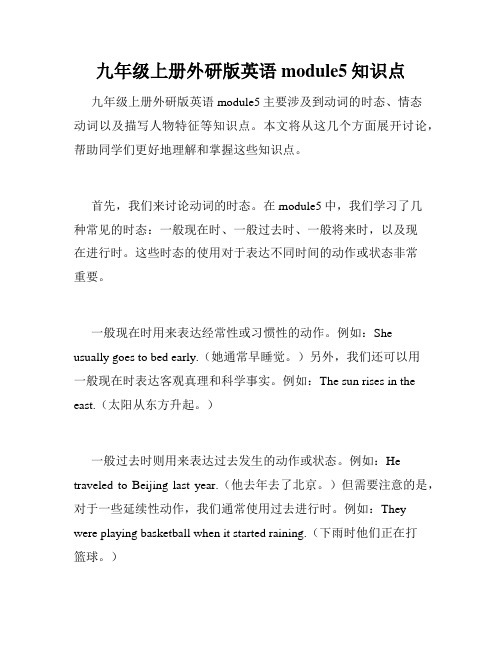
九年级上册外研版英语module5知识点九年级上册外研版英语module5主要涉及到动词的时态、情态动词以及描写人物特征等知识点。
本文将从这几个方面展开讨论,帮助同学们更好地理解和掌握这些知识点。
首先,我们来讨论动词的时态。
在module5中,我们学习了几种常见的时态:一般现在时、一般过去时、一般将来时,以及现在进行时。
这些时态的使用对于表达不同时间的动作或状态非常重要。
一般现在时用来表达经常性或习惯性的动作。
例如:She usually goes to bed early.(她通常早睡觉。
)另外,我们还可以用一般现在时表达客观真理和科学事实。
例如:The sun rises in the east.(太阳从东方升起。
)一般过去时则用来表达过去发生的动作或状态。
例如:He traveled to Beijing last year.(他去年去了北京。
)但需要注意的是,对于一些延续性动作,我们通常使用过去进行时。
例如:They were playing basketball when it started raining.(下雨时他们正在打篮球。
)一般将来时用来表达将来发生的动作或状态。
例如:I will call you tomorrow.(明天我会给你打电话。
)另外,我们还可以使用be going to来表示打算或计划要做某事。
例如:She is going to visit her grandparents next week.(下周她打算去看望她的祖父母。
)另外,在module5中,我们还学习了现在进行时。
现在进行时用来表达现在正在进行的动作。
例如:She is eating dinner right now.(她正在吃晚饭。
)接下来,我们来讨论情态动词。
在module5中,我们学习了几个常见的情态动词,包括:can, could, may, might, must等。
这些情态动词在句子中起到了表示能力、许可、可能性、必要性等不同的意义。
外研版九年级英语上册Module 5 模块语法写作课件

名师点评:
◆本文是一篇介绍参观场所的文章,作者分为三个环节: 1.简要概括该参观场所(第一段) 2.告诉人们在参观时应该做什么和不应该做什么 (第 二段) 3.说明遵守这些规则的重要性(第三段)
◆本文的添彩点: 文章用多种句式来表达,增强了文章的层次性。恰当运 用本模块所学知识重点描述了中国军事博物馆中所要遵 守的一些规则。
考点 2【重点】表示“禁止做某事”的结构
考向一 No+动名词 eg:No swimming alone. 请勿独自游泳。
典例 Which sign means “No Smoking”? ___A_____ (贵州遵义)
【点拨】A项表示“禁止吸烟”;B项表示“禁止停止”; C项表示“禁止左转”。问句句意为:哪个标志意思是 “禁止吸烟”?故选A。
考向三 Don‘t+动词原形 eg:Don't open the window. 不要打开窗户。
典例
“____A____run in the hallways, Mike.”
“Sorry, Ms Clark.”
( 贵阳 )
A. Don't B. Please C. Let's
【点拨】此题用正确把握语境法。答语句意为“对不起, 克拉克女士。”由逻辑推理可知,说话者是在错误行为被 指出之后表示道歉,故上句句意应为“迈克,不要在走廊 里面跑。”祈使句的否定形式应在动词原形前加don't,故 返回 选A。
即学即练
一、用括号内所给词的适当形式填空 1.(2015·宿迁) Don’t ___d_r_o_p_______(drop) litter every-
where. Always keep our school clean. 2.Tom,____d_o_n_’t_b_e____(not be) afraid of speaking in front
2022年外研版九年级上册Module 5 语法梳理

Module 5 知识点一:Me too. 和So do II’m 16 years old .Me too .=So am I .I usually walk to school .Me too .=So do I .Me too 表示的是和别人一样的意思,通常不含有动作的意思。
例:I would like a cup of coffee.Me too .So do I 。
一般表示一个人说他做了什么,另外一个人表示自己也做了同样的动作,使用范围比Me too 小。
二:against 的用法:是介词,不是动词1,表示“反对”,反义词是“for”.表示强烈反对,用副词strongly修饰against例:Are you for or against the plan?Public opinion is strongly against his visit to the country.2,表示位置,“靠着,倚,碰,衬托”例:The teacher’s desk is against the wall .这位老师的桌子靠墙放着He stood leaning against the tree .他站着,倚靠在树上。
例:One of the opinions _____smoking is that it is harmful to people’s health.A, for B, against C, at D, in三:why not …?=why don’t you …?Why not go to the park on foot ? It’s quite near .All right !Why not ask Mr. Wu to help us ?Because he is busy now .四:no wonder的用法:No wonder +(that)从句=It is no wonder +(that )从句:“难怪。
外研版英语九年级上册Module5 要点点击

Module5要点点击【原文再现】My classmates and I have got to write a report for homework by Friday.【难点点击】这里的by意为“在……之前〞,可用于各种时态中。
【原文再现】He’s gone off on his own.【难点点击】这里的go off意为“离开〞,相当于leave,go off to ...的意思是“(离开所在的地方)启程去另一个地方〞。
go off还可以表示“熄灭,停电;质量变坏,恶化〞等含义。
如:Suddenly, the lights went off. 突然灯灭了。
The milk has gone off. 牛奶已经坏了。
【原文再现】No wonder it looks real.【要点点击】No wonder (that) + 从句= It is no wonder (that) + 从句,可翻译为“难怪,一点都不奇怪〞。
如:Tom has been eating sweets all day. No wonder he is not hungry. 汤姆整天都在吃糖果, 难怪他不饿。
【原文再现】… you have t o move a kind of truck on wheels into the correct position.【难点点击】on可以表示支点,可译为“以……为支撑,挂在……上;以……为轴〞等。
【原文再现】There are also rooms on transport …【要点点击】此处的on译为“关于〞。
当表示此含义时,on与about可以互换,但是on多暗示内容比拟专业,而about那么表示在内容或观点上都比拟一般。
试比拟:a lesson on space technology 有关太空技术的课a talk about friendship有关友谊的谈话另外,有的动词或名词既可与about又可与on连用,而有的却只能与about 连用〔如:learn, read, teach, a story等〕,而report只能与on连用。
外研版九年级(上)英语第10讲:Module 5语法(学生篇)

外研版九年级(上)英语第10讲:Module 5语法(学生篇)第10讲Module 5语法篇____________________________________________ __________________________________________________________________________________ ______________________________________祈使句no doing 及if 从句(1)。
重点句型Grammar祈使句:1. No shouting, please! 请勿喧哗!Don’t cross that crop! 不要越过那条绳子!No photos. 请勿拍照。
2. 表示“禁止做某事”的结构,它的主要构成形式有:1) No + 动名词No smoking. 禁止吸烟。
No shouting. 请勿喧哗。
No joking! 不要开玩笑!If you want to know what to see, look at the guide.如果你想知道可参观的内容,就读一下指南吧。
if后面通常接一个完整的句子作从句。
2. if从句的位置if引导的从句可以放在主句之前,也可以放在主句之后。
例如:If you ever go to London, make sure you visit the Science Museum.如果你去伦敦,一定要去参观科学博物馆。
可以改写为:Make sure you visit the Science Museum if you ever go to London.3. if从句的用法本模块主要学习并运用“if从句+祈使句”这种结构来表达建议。
比如说,如果对方生病了,你建议他去看医生,就可以说:If you do not feel well, please go to see the doctor.你如果感觉不舒服,就去看医生吧。
- 1、下载文档前请自行甄别文档内容的完整性,平台不提供额外的编辑、内容补充、找答案等附加服务。
- 2、"仅部分预览"的文档,不可在线预览部分如存在完整性等问题,可反馈申请退款(可完整预览的文档不适用该条件!)。
- 3、如文档侵犯您的权益,请联系客服反馈,我们会尽快为您处理(人工客服工作时间:9:00-18:30)。
Module 5 Museums让步状语从句连词有:although/ though, even if/ even though, however, whatever,…wh-ever.(1) although/though引导的让步状语从句although和though,都作"虽然;尽管"解,通常可以换用,although的语气较重。
如果要强调"但是"语气,可使用yet,still或nevertheless来表示"但是"、"依然"或"然而"之意,但是不能与but连用。
Although they have been talking for a long time, he cannot make her believe him.= ______.虽然和她谈了半天,他还是不能让她信任自己。
The text is few new words, but the students can't understand.= ________.这课文几乎没有新单词,但是学生们不能理解。
(2) even if引导的让步状语从句even if "即使,纵然",从句表示的是尚未发生的动作或存在的情况。
如:Even if it rains tomorrow,___________.即使明天下雨,我们也不改变计划。
Even if I failed again, I will not _____________ the experiment.即使我再次失败,我也不会放弃实验。
(3) even though引导的让步状语从句even though"虽然,尽管",从句所表示的是已经发生的动作或存在的情况,通常可以和although/though换用。
如:Even though I didn't understand a word,I kept smiling.即使我一个字也不懂,我还是保持微笑。
Even though you say so,I do not believe it.即使你这样说,我也不信。
(4) whatever/no matter what引导的让步状语从句Whatever等于no matter what,用法相同,都作"无论什么"解,后者多用于非正式文体。
如:Whatever/No matter what he says,don't go.不管他说什么,你都不要走。
We are determined to fulfill the task,_____________.不管发生什么了,我们决心完成任务。
(5) whichever/no matter which引导的让步状语从句whichever和no matter which用法相同,都作"无论哪个"解,后者多用于非正式文体。
如:_____________ you buy,there is a six-month guarantee.不论你买哪个,都有六个月的保修期。
(6) whoever/no matter who引导的让步状语从句whoever和no matter who用法相同,都作"无论谁"解,后者多用于非正式文体。
如:You can't come in,__________.不管你是谁,都不能进来。
No matter who wants to speak to me on the phone, tell him I'm busy.= _________.不管谁要我接电话,就说我现在正忙着呢。
(7 wherever/no matter where引导的让步状语从句wherever和no matter where用法相同,都作"无论在(或到)哪里"解,后者多用于非正式文体。
如:Wherever you go, I'm right here waiting for you.= ___________.无论你到哪里,我都依然在这里等着你。
(8) however/no matter how引导的让步状语从句however和no matter how用法相同,都作"无论如何……"解,后者多用于非正式文体。
However much you regret doing that,there is nothing you can do about it now.无论你可能多么懊悔你曾经做过的事,现在也无济于事了。
______________ it may be,it can't reach the sky.它不论有多高,也高不到天上去。
(9) whenever/no matter when引导的让步状语从句whenever和no matter when用法相同,都作"无论何时"解,后者多用于非正式文体。
如:____________ I'm unhappy,he cheers me up.每当我不高兴时,他就给我鼓劲儿。
Module 5 MuseumsUnit 2 If you ever go to London,make sure you visit the ScienceMuseum一、用所给词的适当形式填空1.Visiting the Science Museum _____________________ (be) very interesting.2.Please turn down your radio;it’s too ___________________ (noise).3.The box is __________________ (fill) of books.You can’t carry it.4.Have you ever ______________________ (be) to Australia.5.There ______________________ (be) no shouting and no running in most museums.二、用方框内所给的词组的正确形式填空1.His sister is a singer ______________________ writer.2.Some students always admire the rich.They often ______________ themselves________________ others.3.Have you ____________________________ whose bike it is?4.If you go to China,__________________________ you visit the Great Wall.5.They will go to America to ________________________ American culture.三、单项选择1.The boy read the article _____________ and found something important in it.A.careful enoughB.carefully enoughC.enough carefulD.enough carefully2.My host family tried to cook ____________ for me when I studied in New Zealand.A.different somethingB.different anythingC.something differentD.anything different3.I don ’t know if Jack ___________.If he _____________,call me,please.A.will come;will comees;comeses;will comeD.will me;comes4.Be careful!The bowl ____________ hot water.A.full ofB.fill withC.is filled withD.is fulled of5.-_____________ a volunteer is great.-I think so.Some of us want _____________ volunteers as well.A.Being;beingB.To be;beingC.Being;to beD.Be;to be6.-I ’ll go to France for a holiday next month.-Great!___________!A.Good luckB.Best wishesC.Glad to see you againD.Have a good time7.You __________ touch it,and you can ’t take photos,____________.A.don ’t;tooB.mustn ’t eitherC.aren ’t;eitherD.mustn ’t;as well8.-Excuse me,Sir.Smoking _____________ in the gas sation.-Oh,I ’m really sorry.A.doesn ’t allowB.isn ’t allowedC.aren ’t allowedD.haven ’t allowed四、根据汉语提示完成句子1.她喜欢游泳和跳舞,也喜欢唱歌和跑步。
_________________________________________________________________________.2.老师让我把杯子装满水。
_________________________________________________________________________.3.父母总拿我和姐姐比较。
_________________________________________________________________________.4.每天数以千计的游客参观金石滩。
_________________________________________________________________________.5.最受欢迎的名胜古迹之一是紫禁城。
